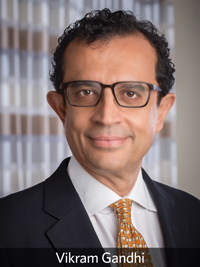Investors and corporations are realizing that climate change cannot be ignored when weighing future investment risks, according to Vikram Gandhi, a Harvard Business School professor who teaches that school’s first course on impact investing.
And this concept will likely take center stage with the new presidential administration in Washington, D.C., Gandhi said in a recent interview.
“The momentum is there for investors to consider environmental, social and corporate governance issues when making investments," Gandhi said. "That train has already left the station. Now the question is how to integrate those issues into business and how to have meaningful disclosure about what companies are doing. Disclosure of corporate actions is important because you can change what you can measure.”
 He noted that younger investors take climate change and other ESG factors more seriously than older investors, and they alter their behavior accordingly. A recent study of high-net-worth families by Barclays showed that 70% of older wealthy generations said the millennial generation is leading their family towards more sustainable investing. The research also revealed that 80% of wealthy families have already changed their investments to express more of their beliefs in social and environmental responsibility, according to Barclays Private Bank’s “Smarter Succession” research study.
He noted that younger investors take climate change and other ESG factors more seriously than older investors, and they alter their behavior accordingly. A recent study of high-net-worth families by Barclays showed that 70% of older wealthy generations said the millennial generation is leading their family towards more sustainable investing. The research also revealed that 80% of wealthy families have already changed their investments to express more of their beliefs in social and environmental responsibility, according to Barclays Private Bank’s “Smarter Succession” research study.
The movement to take ESG, and climate change in particular, into account for investing can be pushed forward by both government regulations and by corporations through changes in behavior.
“Such actions as getting the United States back into the Paris Climate Accord and promoting favorable regulations through executive orders” can go a long way towards advancing the issue, Gandhi said.
The U.S. Department of Labor recently issued a ruling that some investors believe set back ESG investing. The rule, announced earlier this month, said pension fund managers must focus strictly on investment returns when selecting investments and cannot make investments solely on the basis of ESG factors. Funds that use ESG standards can be put in pension funds, but the decision has to be made on financial, not ESG, criteria, the DOL said.
Gandhi pointed out the ruling did not prohibit the use of ESG funds in pension plans, but that the return on investment had to be the criteria used by the fiduciary.
In addition to focusing on government regulations and agreements, investors also are pressuring corporations to consider ESG factors, Gandhi said.
“If corporations will not reveal their efforts to make improvements in manufacturing, distribution methods and supply chains, investors will think the corporation has something to hide," he remarked. "It makes a potential investor wonder what other risks the corporation might be hiding.”
More standardized reporting data is needed to help financial advisors make informed decisions regarding ESG investing for their clients, Gandhi said. The Sustainability Accounting Standards Board, a non-profit organization created to set sustainability standards for different industries, is an example of an organization working toward that goal.
“Advisors and pension plan managers are still reluctant to use ESG as a criteria because they are afraid something might go wrong with the investment; however, if you do not factor climate change into the equation you are not making the right long-term investment decisions,” Gandhi posited. “If a manager is ignoring ESG, he or she is not factoring in the correct risk to the corporation and the investment.”








